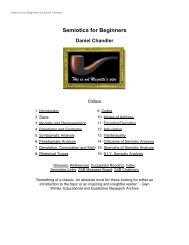Semiotics for Beginners by Daniel Chandler
Semiotics for Beginners by Daniel Chandler
Semiotics for Beginners by Daniel Chandler
Create successful ePaper yourself
Turn your PDF publications into a flip-book with our unique Google optimized e-Paper software.
<strong>Semiotics</strong> <strong>for</strong> <strong>Beginners</strong> <strong>by</strong> <strong>Daniel</strong> <strong>Chandler</strong><br />
Rosalind Coward and John Ellis also comment that 'structural analysis proved to be inadequate to<br />
account <strong>for</strong> the differences between texts' (Coward & Ellis 1977, 5). The focus on 'underlying<br />
structures' which characterizes the structural <strong>for</strong>malism of theorists such as Propp, Greimas and Lévi-<br />
Strauss neglects 'surface <strong>for</strong>ms' which may be important in themselves (Cook 1992, 71). This is<br />
particularly vexatious <strong>for</strong> literary critics, since it appears to ignore issues of stylistic difference.<br />
Varda Langholz Leymore, who herself employed a structuralist approach, argued that:<br />
Semiological studies derive a great inspiration from linguistics, yet in most cases they fall short<br />
of complying with probably its most revolutionary aspect, the infinite creativity of the base<br />
rules. In most semiological studies the identification of structure is tantamount to creating<br />
<strong>for</strong>mal schemata into which all individual members of the system may, following some rules, be<br />
reduced. However, the converse is not true. The systems are incapable of generating one<br />
single example which belongs to their universe of discourse, in the sense that Chomsky is able<br />
to generate sentences. In other words, the rules enabling one to 'trans<strong>for</strong>m back' from the<br />
deep structure to the surface structure, are not specified. In this sense most semiological<br />
studies are not generative but static.<br />
(Langholz Leymore 1975, 15)<br />
Some contemporary theorists have rejected a purely structuralist semiotics. But such a rejection need<br />
not involve a wholesale rejection of semiotics. Influential as it has been, structuralist analysis is but<br />
one approach to semiotics. Many of the criticisms of semiotics are directed at a <strong>for</strong>m of semiotics to<br />
which few contemporary semioticians adhere. Whilst some semioticians have retained a structuralist<br />
concern with <strong>for</strong>mal systems (mainly focusing on detailed studies of narrative, film and television<br />
editing and so on), many have become more concerned with 'social semiotics' (Hodge & Kress 1988).<br />
A key concern of social semioticians is with what Stephen Heath calls the 'specific signifying<br />
practices' (see Lapsley & Westlake 1988, 55). Such 're<strong>for</strong>med' semioticians practise 'poststructuralist'<br />
semiotics, focusing on what one has called 'situated social semiosis' (Jensen 1995, 57). This at least<br />
is the rhetoric of social semioticians, but the extent to which social semiotics has so far met the<br />
concerns of sociologists is debatable. However, it is early days: 'social semiotics' is still under<br />
construction. Contemporary theorists who have associated themselves with this development include<br />
Gunther Kress, Robert Hodge, Theo van Leeuwen, Klaus Bruhn Jensen, Paul J Thibault and Jay<br />
Lemke (Hodge & Kress 1988; Jensen 1995; Lemke 1995; Kress & van Leeuwen 1996; Thibault<br />
1997).<br />
Victor Burgin notes that, of several discourses, 'Marxism and psychoanalysis [the latter particularly<br />
derived from the work of Jacques Lacan] have most in<strong>for</strong>med [poststructuralist] semiotics in its moves<br />
to grasp the determinations of history and the subject in the production of meaning' (Burgin 1982b,<br />
144-5). Strinati argues that semiotics has been used 'to render the Marxist theory of ideology less<br />
deterministic and instrumental. However, this still tends to underestimate the ways in which what is<br />
produced is itself subject to conflicts and negotiations, and how the meanings produced may not be<br />
uni<strong>for</strong>m, consistent, unambiguous or reducible to a coherent dominant ideology' (Strinati 1995, 127;<br />
see also Tagg 1988, 23ff, 153-83). Another inflection of semiotics is Foucauldian - emphasising 'the<br />
power effects of discursive practices' (Tagg 1988, 22).<br />
It is only fair to note that much of the criticism of semiotics has taken the <strong>for</strong>m of self-criticism <strong>by</strong><br />
those within the field. The theoretical literature of semiotics reflects a constant attempt <strong>by</strong> many




